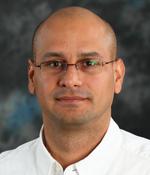 |
Nestor OviedoProfessor, Molecular & Cell Biology
|
noviedo2@ucmerced.edu(209) 228-4541Full Profile |
 |
Axel ViselAdjunct Professor, Molecular & Cell Biology | avisel@ucmerced.eduFull Profile |
 |
Chris AmemiyaProfessor, Molecular & Cell Biology | camemiya@ucmerced.eduFull Profile |
 |
Stephanie WooAssociate Professor, Molecular & Cell Biology The Woo Lab is interested in how dynamic cellular processes such as cell migration and cell adhesion contribute to the formation of the gastrointestinal epithelium, using the zebrafish embryo as our model system. We are also interested in developing new tools to study in vivo cell biology. Publications: Woo, S, Housley, MP, Weiner, OD, and Stainier DYR (2012) Nodal signaling regulates endodermal cell motility and actin dynamics via Rac1 and Prex1. J. Cell Biol. 198(5): 941- 952. Reade, A, Motta-Mena, LB, Gardner, KH, Stainier, DY, Weiner, OD, and Woo, S (2017) TAEL: a zebrafish-optimized optogenetic gene expression system with fine spatial and temporal control. Development. 144(2): 345-355. |
swoo6@ucmerced.edu(209) 228-4030Full Profile |
 |
Jennifer O. ManilayProfessor, Molecular & Cell Biology Professor Manilay is a developmental immunologist, with research interest in the mechanisms that control cell fate decisions in the immune system. Her current topic of study is the development of T lymphocytes, important components of immune defense against pathogens. |
jmanilay@ucmerced.edu(209) 228-4175Full Profile |
 |
Katrina HoyerProfessor, Molecular & Cell Biology Immunological tolerance and autoimmune disease Cellular and molecular interplay between lymphocytes and dendritic cells |
khoyer2@ucmerced.eduFull Profile |
 |
Miriam BarlowProfessor, Molecular & Cell Biology
Evolution of bacteria Predicting the evolution of antibiotic resistance Testing evolutionary theory |
mbarlow@ucmerced.edu(209) 228-4174Full Profile |